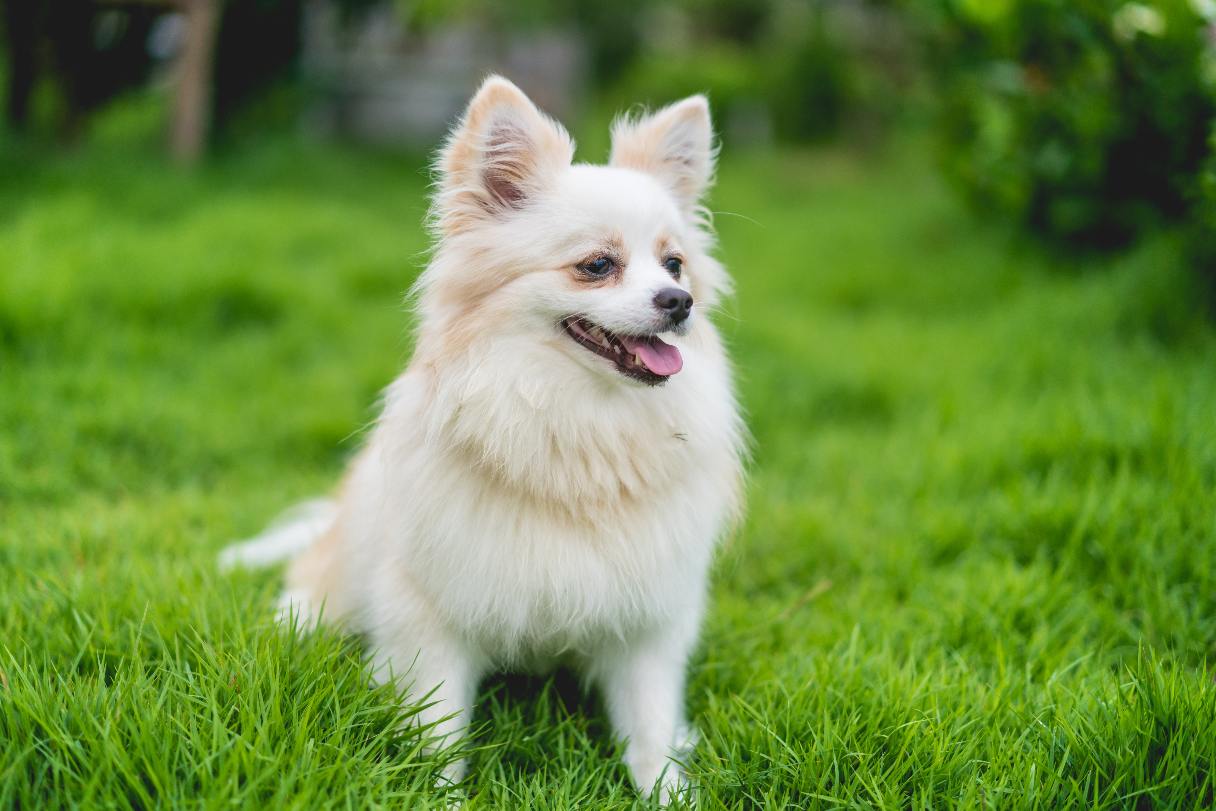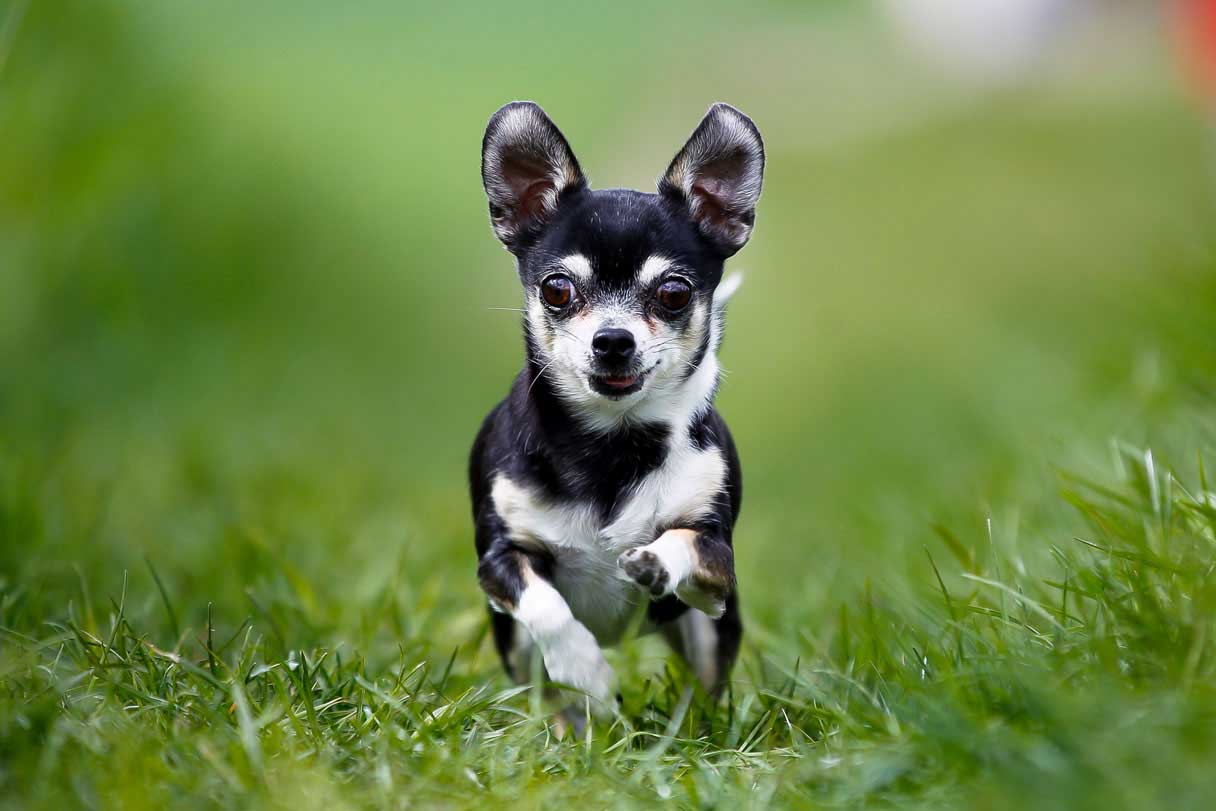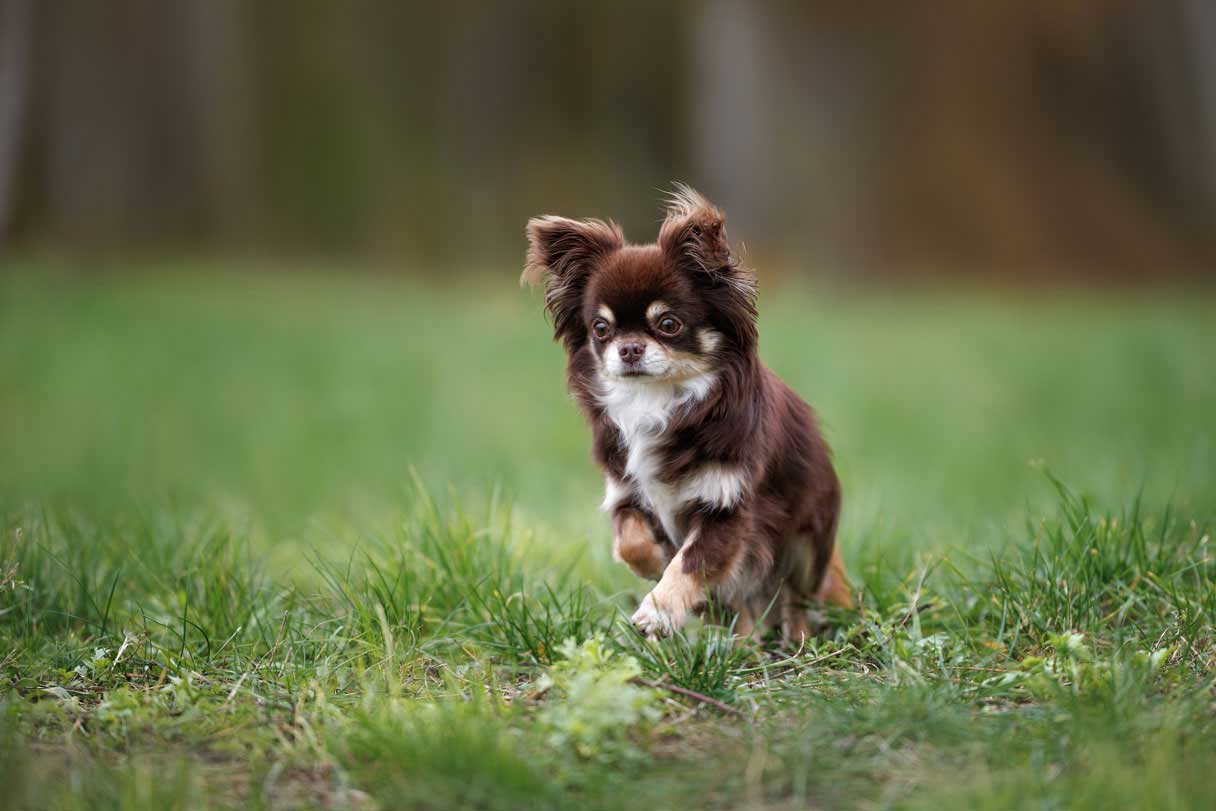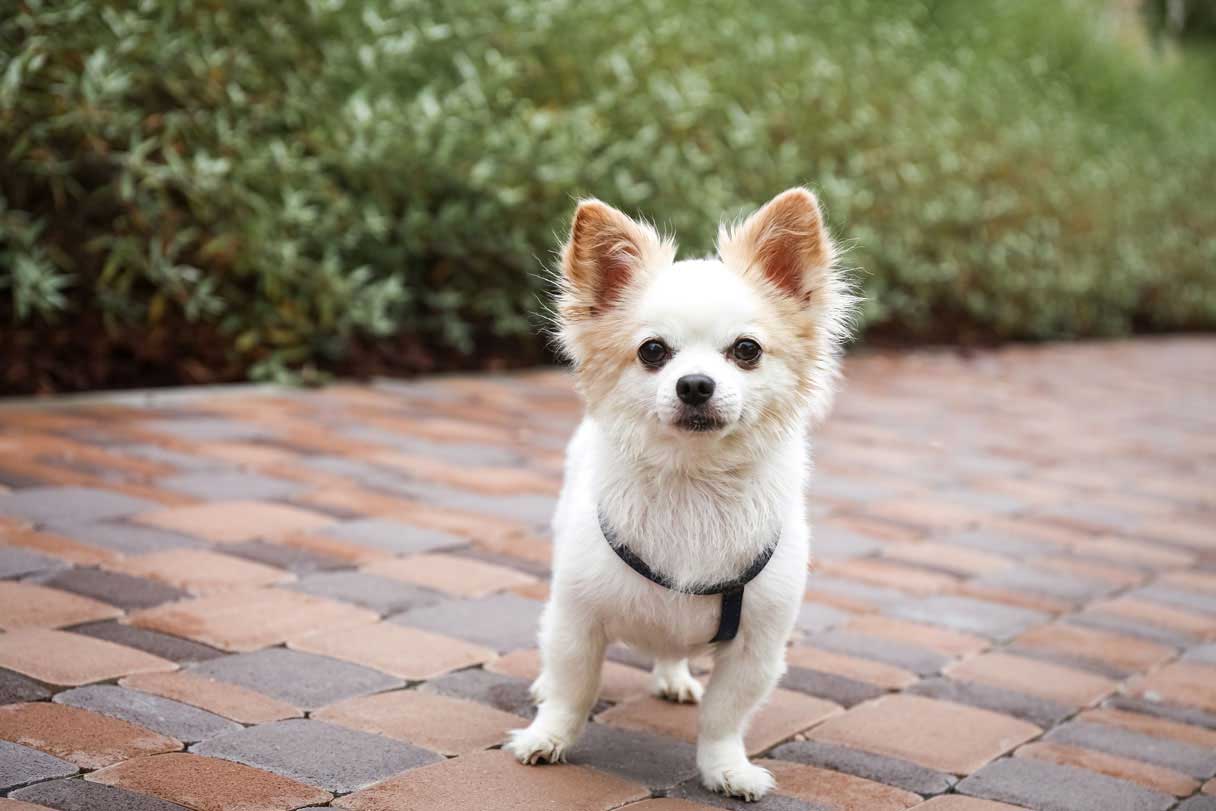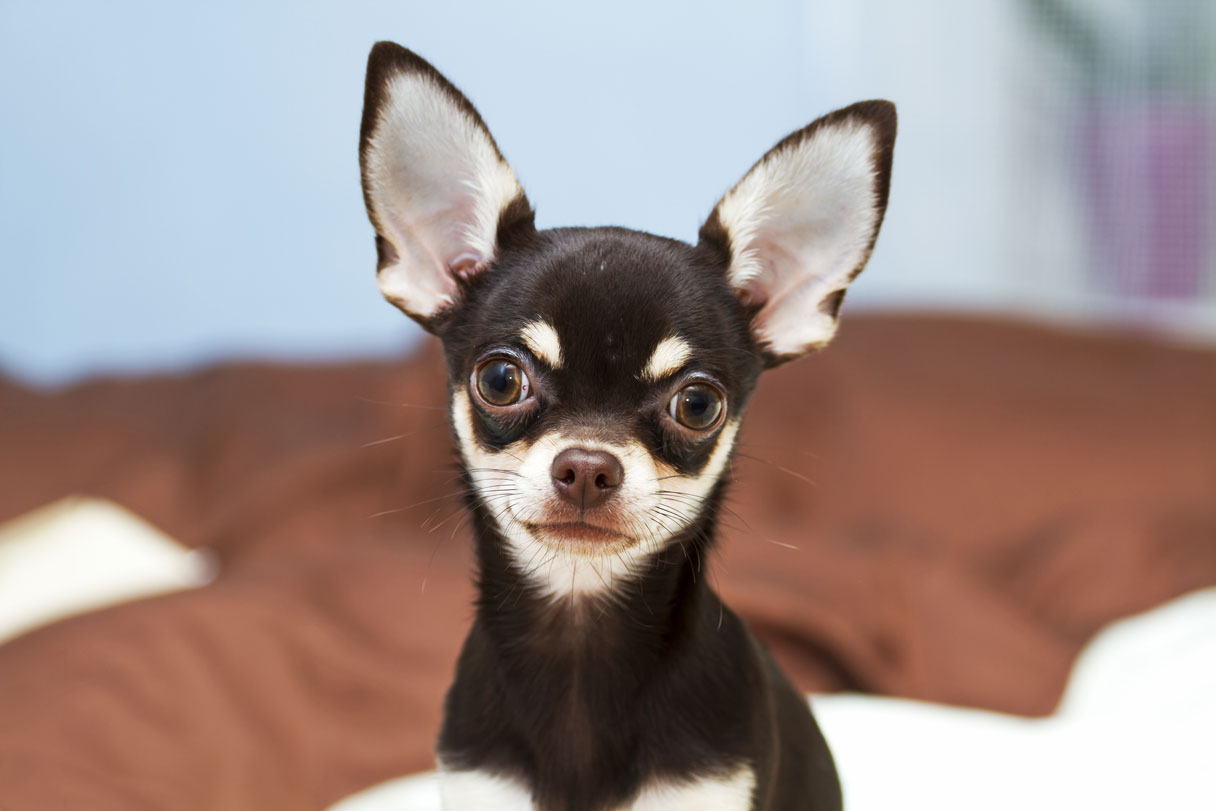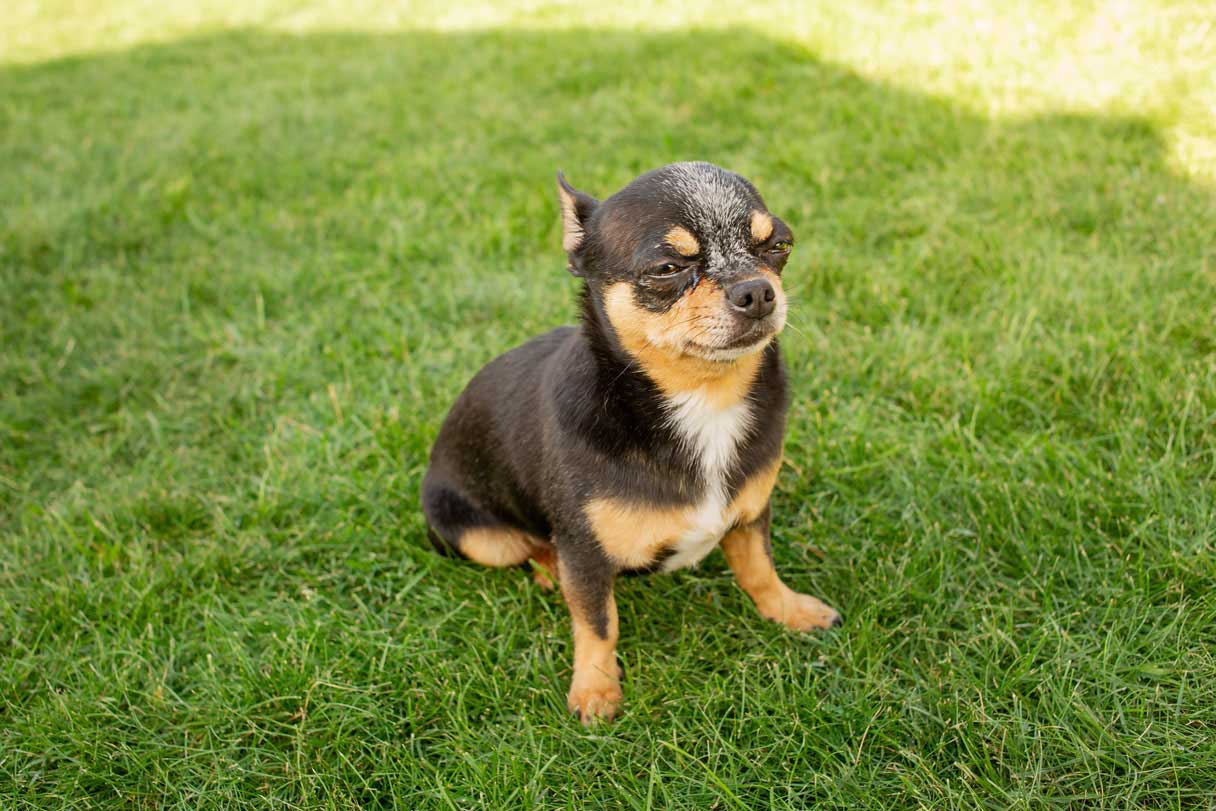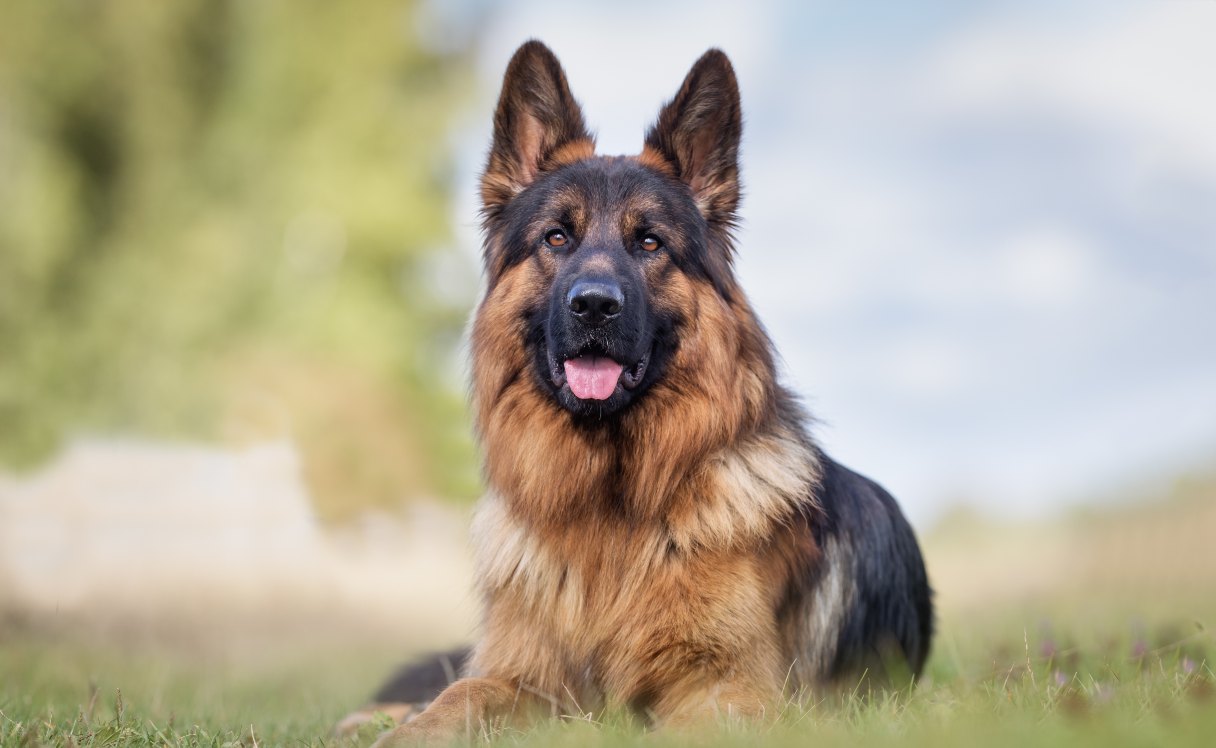Chihuahuas pack major big dog energy into their tiny little bodies. These bright, spunky and adorable little dogs are the quintessential purse pup, but there’s so much more to them than a cute fashion accessory. Learn more about the Chihuahua, including temperament, health and wellness needs and what it’s like to keep and care for one of the world’s tiniest dogs.
About the Chihuahua
Chihuahuas — Chis for short — are native to Mexico, thought to be descended from the Techichi, a slightly larger dog breed that was prized by both the Toltecs and the Aztecs. The latter are given credit for breeding these dogs into something more closely resembling the modern Chihuahua, which is named after the Mexican state from which American breeders obtained breeding stock in the mid-19th century.1
Chihuahuas were first recognized as an official breed by the American Kennel Club (AKC) in 1904. Since then, these little dogs have gone on to be prized by celebrities and have gained work as movie stars.2
Chihuahua Appearance
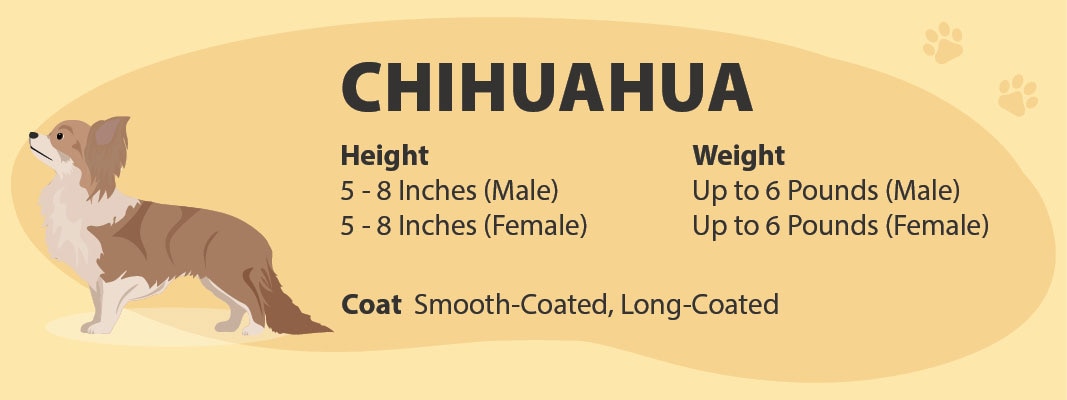
According to the breed standard, both male and female Chihuahuas should stand between 5 and 8 inches at the shoulder and weigh no more than 6 pounds.1 Larger Chis are outside of the standard qualifications for the breed.3 Note that there is no such thing as a “teacup Chihuahua” — the Chihuahua Club of America identifies this as a made-up label applied by unscrupulous sellers to the smallest pups in a standard litter.4
There are only two “types” of Chihuahuas recognized by the AKC: smooth-coated and long-coated.4 Smooth-coated Chis have a short, smooth and soft coat all over their body, and may or may not have an undercoat.3 Long-coated Chis have longer hair all over that is soft and may be straight or slightly wavy.3 Both varieties come in a wide range of colors and markings.1 But the merle coat color pattern is discouraged due to hearing and health problems associated with the genes responsible for that coloring.5
Other than the coat, there is no difference in appearance between the two varieties.1 Chihuahuas are easily discernible from other tiny dog breeds by their apple-dome-shaped heads; large, round eyes; short, narrow muzzles; and large, erect ears.3
Some Chis are born with a soft spot on top of their heads, similar to that of a human newborn, called a molera. While extra care should be taken to protect the skulls of these Chis, the presence of a molera isn’t associated with any health issues and is not considered a defect, nor is it considered a mark of breed purity.6
Chihuahua Temperament
A well-bred and socialized Chi is sweet, loving and loyal with their people. They tend to be reserved with strangers, but they should be confident and aloof, not nervous or aggressive.7 That said, they may warm up to new people and make friends if given enough time.7 They’re also protective of their families and territory and make excellent watchdogs that will alert you to stranger danger.1
Chihuahuas tend to be fearless and have no concept of their small size in relation to other dogs.1 They can be prone to territorial aggression and won’t back down from challenging a dog that could literally eat them for lunch.1 Chi owners must be vigilant to prevent their little pups from blustering their way into dangerous situations that could all too easily end in tragedy and tears.
These are intelligent dogs that respond well to positive, rewards-based training. They’re mostly eager to please, although they can be a bit stubborn and they get bored quickly. They’re the kind of smart that needs to have a good reason why they should obey, rather than just doing it to make you happy. But they love to play and have a good time, so you can make it easy for them to learn by keeping training sessions short and fun.1
Unfortunate clichés abound that depict Chis as high-strung, nervous, excessively yappy and aggressive with people. This type of behavior is usually the result of bad breeding or poor socialization. Good breeding, proper training and plenty of socialization as puppies can make all the difference between having a shivering, yappy little fur-shark with a hair-trigger temper or having the sweetest and most fun little BFF you could ever ask for.
Living With a Chihuahua
Chihuahuas are relatively low maintenance and can adapt well to a lot of situations.1 That said, they’re not the right breed for everyone. Here’s what you should know about what it’s like to live with and care for a Chihuahua so you can make an informed choice, along with helpful tips for both current and prospective Chihuahua parents.
Who they’re best for
The ideal home for a Chihuahua is one in which there are no small children or large dogs, and where they won’t be left alone for hours at a time. If their human can’t be with them throughout the day, they’ll love another small dog — preferably another Chi — to keep them company.7
Chihuahuas have an instinctive aversion to small children, who tend to play too roughly and run the risk of injuring them.1 And while Chis can get along well with other dogs, as well as cats, they should be closely supervised in the company of larger pets.1 Crate-training your Chi can also help ensure their safety when you can’t be there to keep an eye on them.
Chis need an owner who can be vigilant about watching out for their safety. This may mean not allowing small children to handle them and not letting them play roughly with bigger dogs, as well as keeping them close on walks. This is not only to protect them from potential dangers but also to protect them from themselves and their lack of awareness of their tiny size.
Living space
Chihuahuas don’t need much space and can fit in well in any type or size of home. For their own safety, a fenced yard is best, but they shouldn’t be allowed to roam the yard without someone keeping an eye on them. If you don’t have a fence, they should stay leashed when going outside to do their business.7
Exercise and activity
Chihuahuas are energetic, but they don’t need a lot of exercise or space in which to get it. Taking short walks outside to sniff around and potty, following you around the house, and engaging in a few energetic play sessions throughout the day are usually all they need to burn off their energy and stay fit.1
Chis also love toys, and engaging in play with your Chi will provide them with mental stimulation and keep them from getting bored.7 Don’t be surprised if your Chi gets the zoomies and zips around all over the house when they get excited.
Despite their tiny size, Chis are actually quite athletic and enjoy going on walks and hikes. Some Chis even excel in agility sports.8 But their tiny legs and lungs may give out before you do, and your walk or hike will probably turn into a carry before you make it home.1 Even so, your Chi will love going along for the ride. If you want an adventure with a Chi, it’s a good idea to invest in a dog sling or backpack-style carrier for hands-free pup toting.
Even so, after exerting themself, your Chi will be happiest curled up in your lap or tucked in beside you in your favorite chair for a quality snooze fest.1
Grooming
How much grooming a Chihuahua needs depends on their coat. Smooth-coated Chis can get by with occasional bathing and brushing, whereas long-coated Chihuahuas should be brushed at least weekly to remove knots and prevent their fur from matting. Their ears should also be checked regularly for trapped debris or signs of infection.1
In addition, their nails should be kept short enough that they don’t touch the floor when standing or walking. Chihuahuas are also notorious for dental problems, especially as they age. You can’t skip regular toothbrushing with this breed, and your vet may recommend additional measures you can take to help their teeth and gums stay healthy between veterinary dental cleanings.1
Chihuahua Health and Life Expectancy
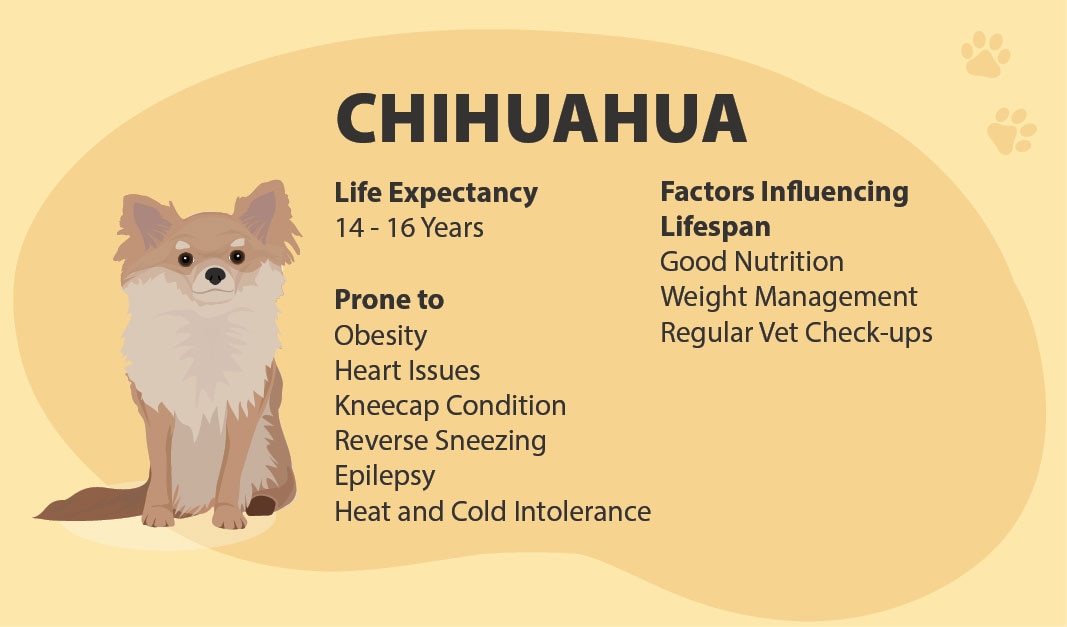
Chihuahuas are typically a long-lived breed, with an average life expectancy of 14 to 16 years.1 Some Chis have even lived into their 20s.9 Good nutrition, regular veterinary checkups and healthy weight management can all go a long way toward extending your Chi’s lifespan.
Chihuahuas should be fed high-quality dog food with a nutritional profile that’s been approved by the Association of American Feed Control Officials (AAFCO). To ensure maximum nutrition, choose a food that’s formulated for your dog’s current life stage.1
Chis are prone to obesity, so be sure to measure food according to package instructions to avoid overfeeding. If you’re not sure what’s the right amount, talk to your vet. Avoid giving them table scraps, and factor treats into their daily calorie allotment. Healthy foods that are safe for dogs can also be given in place of high-calorie commercial dog treats.1
Even with the best preventive care, some Chihuahuas may face health issues that are common to the breed. If you’re shopping for a Chihuahua, look for a responsible breeder who does genetic testing to screen out hereditary health issues. Even then, however, some health issues may be unavoidable. Both current and prospective Chihuahua owners should be on the alert for some specific health conditions.1
Heart issues
Chihuahuas may be prone to a number of heart conditions, including patent ductus arteriosus (PDA) and mitral valve disease (MVD).1 PDA is a congenital heart defect in which the opening between the aorta and the pulmonary artery doesn’t close properly at birth.10 PDA may be corrected with surgery.10
MVD is a condition in which the mitral valve of the heart degenerates and thickens, which can lead to fluid accumulation and congestive heart failure. Both MVD and congestive heart failure are managed through medication, nutrition and lifestyle alterations.11
Luxating patella
In this condition, which is common to small dogs, the kneecaps of the hind legs become easily dislocated. In mild cases, you may not need any intervention other than occasional pain management with anti-inflammatory medications or other therapies. Severe cases may be improved with surgery.12
Reverse sneezing
Reverse sneezing may look and sound a little alarming, but it isn’t serious. This is another condition that’s common to small breeds. When something irritates the nasal or sinus passages, the dog will suddenly suck in air forcefully through the nose, usually producing a loud honking sound. It may happen repeatedly until the irritant is dislodged.13
With Chihuahuas, reverse sneezing episodes often get triggered by excitement.7
Epilepsy
Epilepsy is a seizure disorder caused by abnormal brain function. The cause of the abnormality is usually unknown. Seizures may be general, causing loss of awareness as the entire body seizes up, or focal, resulting in behavioral tics such as head shaking, circling or biting at invisible flies. While there is no cure, it can usually be managed with medication.14
Heat and cold intolerance
While not exactly a health condition, Chihuahua parents should be mindful of helping their Chi regulate their body temperature. There’s a good reason why the sweater-wearing Chihuahua is such a cliché: These pups come from a warm climate and don’t tolerate the cold well. The only thing they love more than taking a nap in the sun is burrowing deep down in the blankets for a cozy snooze.2
Conversely, although Chis will seek out warmth wherever they can get it, as a short-nosed breed they can also be prone to overheating. Take care not to let them sleep in the sun for too long, and never leave your Chi alone in the car on a warm day, even with the windows down.
Buying or Adopting a Chihuahua
The average cost to purchase Chihuahua puppies from a reputable breeder is $1,500 or more.15 The cost depends on location and whether the parents are from championship lines, and generally includes early healthcare, vaccinations and genetic testing.
Chihuahuas and Chihuahua mixes of all ages are often available through pet shelters and Chihuahua rescue organizations. Adoption fees for Chihuahuas are generally around $250 to $350, depending on the location, the age of the dog and any special needs. Typically, the fee covers the cost of vaccinations, spaying or neutering and other necessary vet care.16
You can find a list of reputable Chihuahua rescue organizations across the U.S. at the Chihuahua Club of America.
Frequently Asked Questions About Chihuahuas
Here are some common questions people are asking about Chihuahuas.
CareCredit Credit Card Financing for Dogs
Taking good care of your pet's well-being from nose to tail is essential. Make sure to stay up to date on their regular checkups at the vet to help keep your pet happy and healthy for a lifetime of love. You can use your CareCredit credit card for pet care throughout the year for routine veterinary services as well as emergencies and surgeries.* Use our Acceptance Locator to find a veterinarian near you that accepts CareCredit.
CareCredit is there for you and your pet every step of the way; continue your wellness journey by downloading the CareCredit Mobile App to manage your account, find a provider on the go and easily access the Well U blog for more great articles, podcasts and videos.
In addition to pet care, you can also use your CareCredit credit card for dentistry, cosmetic, vision, hearing, health systems, dermatology, pharmacy purchases, spa treatments and so much more within the CareCredit network. How will you invest in your health and wellness next?
Author Bio
Jean Marie Bauhaus is a freelance writer and novelist who has been writing pet content since 2013. Her work has appeared on Forbes.com, Hill's Pet, Chewy, AKC.org and more.



